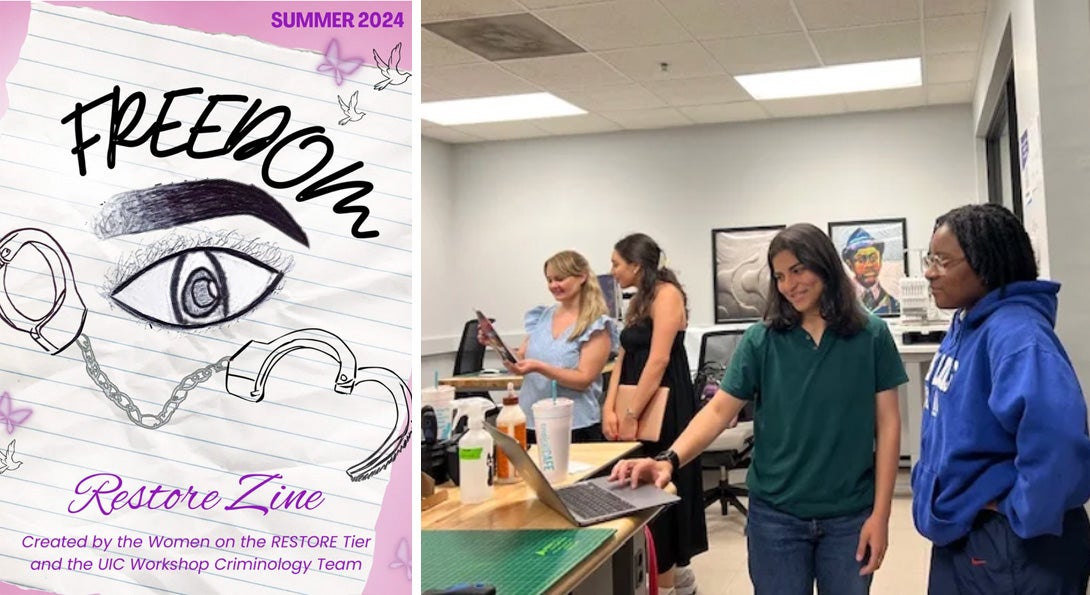Transformative connections

UIC students and incarcerated women collaborate through art
Published on UIC Today
Oct. 14, 2024
What do you get when you bring together UIC faculty and students and incarcerated women at the Cook County Department of Corrections? The answer: a unique summer workshop that engaged facilitators and participants as they explored complex topics while producing a zine of poetry and art.
This past summer, a group of UIC students and faculty from the UIC Library; Black studies department; gender and women’s studies department; criminology, law and justice department; and UIC College of Business Administration hosted the workshop, titled Breaking It Down & Building It Up: Community and Skill-building, twice a week at the Cook County Department of Corrections. Thirty-five women in the facility’s RESTORE program participated. RESTORE, which stands for Rehabilitation and Engagement Supporting Therapeutic Outcomes of Renewal and Empowerment, is aimed at helping the women make positive life changes while incarcerated.
The women participating in the workshop helped determine its direction by incorporating topics of interest to them, from gender-based violence and healing from trauma to setting up a business and preparing to reenter the community.
The practice of feminist collective care — in this context, sharing work and care to foster healing in a setting where the women could express themselves — was the theme behind the zine. Thoughtful, vulnerable discussions were a part of the workshop, too, while the incarcerated women wrote poetry and made art for the publication.
Undergraduate student interns for the workshop, Lauren Hanna and Misbah Ali, led the project to produce a zine presenting the women’s art and poetry. With sensitivity and trust, they gathered contributions from the participants, listened to their visions for illustrations and assembled the pieces.
Each week, the interns gathered pieces by the women and created digital designs from them. They shared drafts with the women and incorporated their feedback. Unique to each woman at the Cook County Department of Corrections, the intentionally co-designed pages ensured their voices were uplifted throughout the design process and their visual stories were told accurately from their individual perspectives.
Hanna and Ali then collaborated with the student staff at the Richard J. Daley Library’s Digital Scholarship Hub to ensure the vibrant illustrations could be printed, cut and bound appropriately, following Cook County Department of Corrections guidelines.
The final product, the “Restore” zine, is a collection of the contributions from the 35 women at the Cook County Department of Corrections. You can read the full “Restore” zine here. The workshop participants received printed copies at a graduation event at the facility. They were excited to see their art and poetry on display and to share their work with peers. Many of the women wanted to read their pieces aloud, prompting cheers and applause from the audience, which included most of the program facilitators.
“Each author’s artwork in the zine truly reflects their identities, individualistic qualities and beautiful characters,” said Hanna, a political science and social justice student at UIC. “Mis and I may have compiled and assisted with the women’s creative vision, but the zine is truthfully made up of the love and trust the women provided us with.
“All in all, supporting the beloved zine, building genuine bonds with the women, furthering my knowledge of mass incarceration and learning of the transformative force education brings to a carceral setting have been the most meaningful experiences of my UIC undergraduate journey,” she added.
“Before embarking on this project with Lauren, the UIC workshop team and, most importantly, the women at CCDOC (Cook County Department of Corrections), I knew nothing about graphic design and poetry,” said Ali, a political science and gender and women’s studies student at UIC. “That’s the beauty of these workshops: As much as the women are crafting, tapping into and learning these skills, so are we.
“I keep coming back to the joy and pride those who contributed felt as they read out loud and saw their work in front of them,” Ali added. “And I hope that they continue to feel that same autonomy and pride in their future endeavors.”